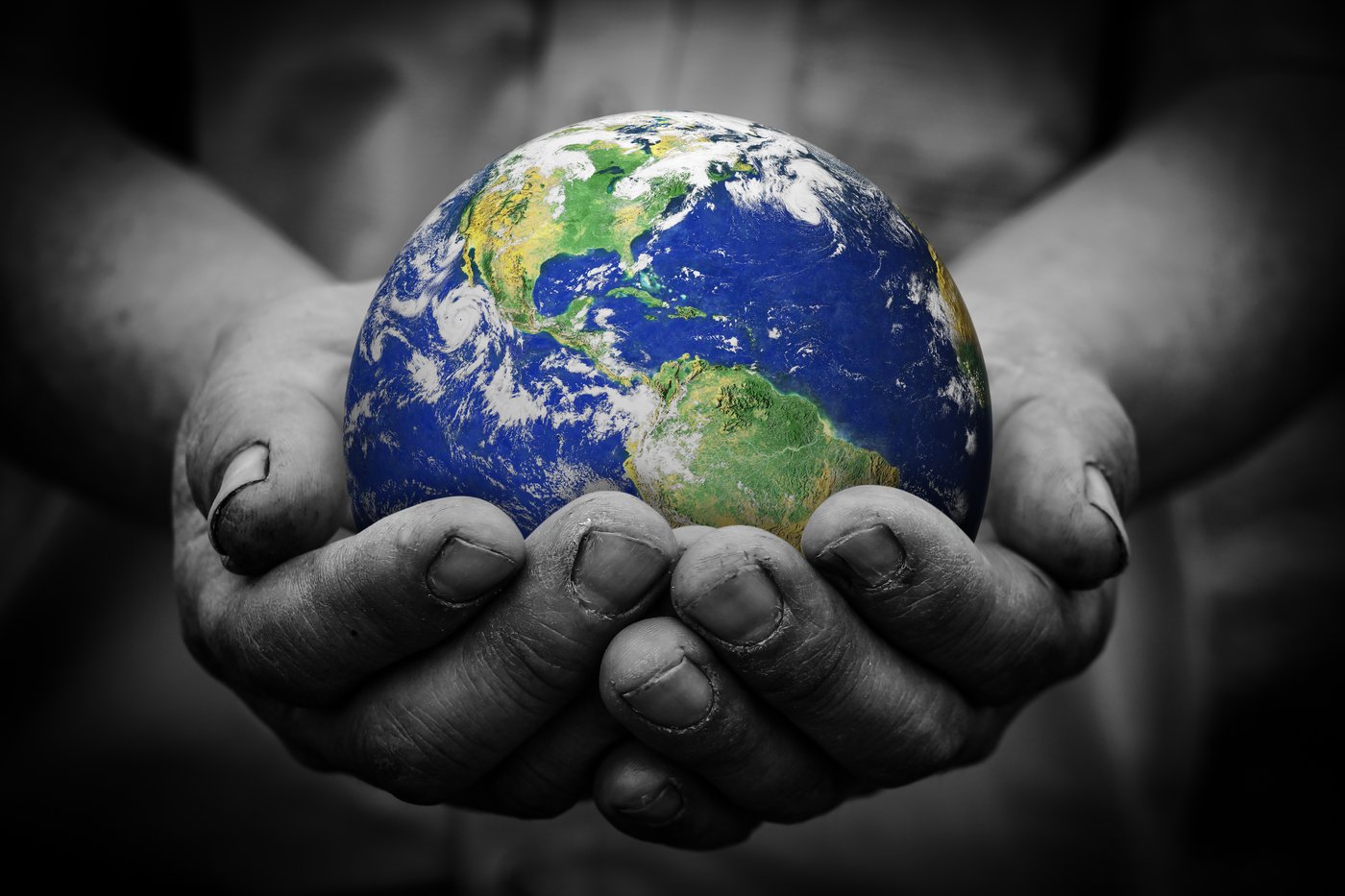
Articles
Here you find all articles from our website which are in English language.
For a complete list of all (including German) articles go here.
Is Sustainability a Christian Imperative?
Robert S. White, FRS

Some Christians have taken the view that God has given the resources of this world primarily for humans to enjoy. They argue that since we have been given dominion over the world (in Genesis 1:28) and that the world will be destroyed in the Apocalypse then we should not worry overmuch about the consequences of activities such as burning abundant fossil fuels, seemingly small climate changes caused by human activity, intensive agriculture that changes ecosystems, and taming/destroying the wilderness for the sake of human expansion. Other Christians agree about the goodness of God’s creation but also point to the aspect of human responsibility for care of that creation acting, as it were, as God’s hands on earth. They see the new creation as a renewal of the earth rather than as a replacement, and point to passages in the Bible that draw attention to the continuity between the present and the new creation of many of the good aspects of human endeavour. They argue that ‘sustainability’ is a good shorthand for the way we should approach our interactions with the world.
The Gift: Giving among People and other Animals
Alexander Massmann

In spite of stagnant wages, in recent years British consumers have increased their average monthly spending by about a quarter for Christmas, and German shoppers are expected to cross the 100 billion Euros mark in the 2019 Christmas season. Children are delighted about little treats, and families and friends prepare for being a “secret Santa.” It may seem that the tail is wagging with the dog – shopping and gift-giving defines Christmas, rather than the other way around. From a Christian perspective, however, it is not surprising that we give gifts for Christmas.
The modern myth of the medieval flat earth
Pablo de Felipe
Today, most people regard flat-earthism as the ultimate in nonsense and as scientific ‘heresy’. To be called a flat-earther is the ultimate of ‘scientific’ insults. For more than a century, however, this very insult has been hurled at a millennium of Western European history, regarded as the bastion of Christian flat-earthism. Christianity has been accused of the suppression of knowledge in this ‘dark age’. But is there any truth in this accusation?
Charles Darwin on Religion
John Hedley Brooke
What did Darwin have to say about religion? What were his religious, or anti-religious, beliefs? Did he believe that his theory of evolution by natural selection was incompatible with belief in a Creator? Was it his revolutionary science that turned him into an agnostic? It is important to answer these questions in a balanced way because Darwin’s authority and example are continually invoked to justify metaphysical and theological claims that go far beyond the details of his evolutionary biology and that of his scientific successors.
Top Topics in the Science and Theology Dialogue – From a Personal European Theological Perspective
Michael Welker
In the last 30 years the science and theology dialogue was strongly developed in the Anglo-American world. In his book “Science and Theology: The New Consonance” (1998) Ted Peters brought together 13 voices of this dialogue and characterized the field by identifying four different phases of it: first, the method phase, second, the physics phase, third, the biology phase, and forth, the theology phase. I entered this dialogue in the second, the physics phase, or rather near its end, that is in the transition from the physics to the biology phase.
Why Humanity needs biodiversity?
Fabien Revol

What a weird title! In the context of the ecological crisis, a good approach would perhaps lead us to ask why biodiversity is so important… in itself? Why humanity would indeed need biodiversity is secondary to that second question and quite obvious: without biodiversity, human life is not possible on Earth, nor is any life at all. The loss of biodiversity is indeed catastrophic for the sake of humanity according to its immediate needs, but one would miss the point of an ecological ethics integrating the human dignity in its reflection. So, let us then consider why biodiversity is required for a genuine human life, but deeper we may understand the true nature of biodiversity to better protect it. Eventually we can go further and see why biodiversity corresponds to a spiritual need of humanity.
Astrotheology
Ted Peters

In the dialogue between theology and the natural sciences, astrobiology provokes a most fascinating set of challenges. Space exploration requires more than merely looking at the stars through a telescope. It necessarily includes Big Bang cosmology, evolutionary biology, and relativity theory. According to NASA in the U.S., “Astrobiology is the study of the origin, evolution, and distribution of life in the universe.
God and the Virus
Andreas Losch

The new coronavirus variant SARS-CoV-2 is gripping the world. Borders are closing, economic activity has been forced to come to a halt for an uncertain period. The invisible enemy is transmitted easily and multiplies before its onset becomes apparent to the patient. This allows it to spread rapidly and particularly endangers the elderly and sick in our society. Not everyone has yet grasped the problem. The number of people infected is doubling every two to three days and we struggle to envisage this exponential growth. The number of sick people and deaths is clearly rising, but today’s figures only show the number of cases from several days ago. Health-care systems are threatened with overload. There are as yet no remedies, only testing possibilities, but too few of those.
Why did the Catholic Church really condemn Giordano Bruno?
Alberto A. Martinez
As an academic discipline, the history of science provides certain insights that are not just significant to history but also to discussions about science and religion. For decades, one of those claims has been the clear conviction that the Catholic Church did not condemn Giordano Bruno for any astronomical beliefs but for religious heresies. He was burned alive in Rome, in February 1600, as a heretic. As someone who debunks myths in the history of science, I too had learned that Bruno did not die because of his beliefs about Earth or the universe. However, after spending much time analyzing primary sources, in Italian and Latin, my impressions began to change.
Thinking of a Wild God
Thomas J. Oord
How are we to think of God’s presence in creation? As of someone atop a tower looking down at insignificant creatures in the flow of history? Some theologians talk about God being “high above” us or transcendent. I think instead of God’s omnipresence and pantemporality. The divine perspective feels all creation rather than looking from above. If one thinks, as I do, that God’s work is always loving and therefore always uncontrolling, one might think the health of God’s ecology of love depends, in part, on how we and other organisms respond to God’s influence.
Was the Big Bang Theory Born out of Belief? Lemaître’s Primeval Atom Hypothesis
Dominique Lambert
It was a physicist and catholic priest, father Georges Lemaître, who developed the nowadays widely hold idea that the universe had a beginning, named the “Bing Bang theory” by its critiques. What inspired him to assume this thought? Did science and faith meet in his scientific theories or how did he distinguish the two?
The foundations of reality: The quantum world and its open questions
Mark Harris

The United Nations has declared that 2025 is to be the International Year of Quantum Science and Technology. The quantum merits such global attention and prestige because of the astonishing success of quantum science.
The Cry of the Earth and the Demise of Wisdom
Celia Deane-Drummond

Looked at theologically, the devastation of the earth through human activities is not simply a threat to present and future generations. Rather, as different rhythmic patterns within the earth system are destroyed or disrupted, so dimensions of God’s original creativity through wisdom are lost. Letting wisdom slip away amounts to a loss of our humanity, even while it is still possible to tune into natural wisdom and so gesture towards an earth that is capable of being restored.
The Myth of a Perennial Battle between Science and Religion
Peter Harrison
400 years ago, on 25 February 1616, Galileo was enjoined by the Catholic authorities to abandon the Copernican hypothesis. The idea that the earth was in motion around the sun was declared to be scientifically ‘foolish and absurd’ and ‘formally heretical’. As is well known, Galileo was reluctant to renounce this new theory and eventually, in the now infamous trial of 1633, was found guilty of suspicion of heresy and sentenced to imprisonment.The trial of Galileo has become emblematic of a supposedly perennial battle between science and religion.
Ian Barbour's Methodology in Science and Religion
Robert John Russell
During the past half century of its inception and flourishing, the question of method lies at the heart of the theology and science community: how are we to relate these two disparate fields? I will take the question as broadly including issues in epistemology, the nature of scientific and religious language, as well as issues in theory construction, choice and defense.
Who Are We, and Where Are We Going?
Ron Cole-Turner
The question of human evolution is really many questions at once. It is, first of all, a scientific question about our past. When did anatomically modern humans first appear? What were the pathways of human migration? Did modern humans interbreed with other closely-related forms of human life, such as Neandertals or the recently-discovered Denisovans?
The consequences of quantum theory
John C. Polkinghorne
The discovery of quantum theory in the first quarter of the twentieth century brought about the greatest revolution in understanding of the physical world since the discoveries of Isaac Newton. The Newtonian world of classical physics was clear and determinate; the quantum world is cloudy and fitful.




















